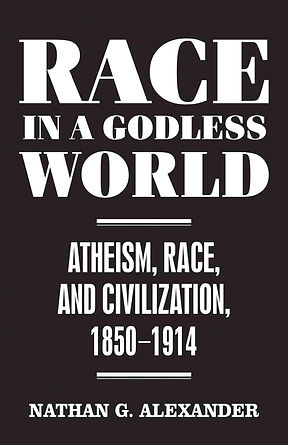top of page
Race in a Godless World:
Atheism, Race, and Civilization, 1850-1914

Available through NYU Press and Manchester University Press
Is modern racism a product of secularization and the decline of Christian universalism? The debate has raged for decades, but up to now, the actual racial views of historical atheists and freethinkers have never been subjected to a systematic analysis. Race in a Godless World sets out to correct the oversight. It centres on Britain and the United States in the second half of the nineteenth century, a time when popular atheist movements were emerging and skepticism about the truth of Christianity was becoming widespread. Covering racial and evolutionary science, imperialism, slavery and racial prejudice in theory and practice, it provides a much-needed account of the complex and sometimes contradictory ideas espoused by the transatlantic community of atheists and freethinkers. It also reflects on the social dimension of irreligiousness, exploring how working-class atheists' experiences of exclusion could make them sympathetic to other marginalized groups.
Praise:
"Race in a Godless World is an excellent study. This is intellectual history at its best, demonstrating how the discriminated against minority of unbelievers, at the foot of the religious pecking order, challenged racial hierarchies and championed racial minorities. The book shows that a commitment to science and reason underpinned racial views amongst both atheist and religionist intellectuals of the nineteenth century. But scepticism and contrariness drew atheists to apply the same reason in shifting towards a more inclusive and progressive social agenda. With a strong structure and vivid clarity, this is the best contribution so far to scholarly study of how racist thinking came to be linked with, but also rejected by, atheists in the USA and Britain."
Callum G. Brown, University of Glasgow
"An exhaustively researched and gracefully written book that makes a signal contribution to our understanding of the intersection of atheism and racial thought. The first book to fully flesh out the ties between racial thought and atheism, it is a masterful achievement that will be required reading for students and scholars of race, freethought, and British and American history more broadly."
Christopher Cameron, University of North Carolina at Charlotte
"Situating the history of freethought in a fully transatlantic framework, Alexander carefully unpacks the ambivalences and contradictions of white atheist views on race and civilisation. Certain about the superiority of science over Christianity, freethinkers were far less clear about the racial and cross-cultural implications of their irreligion. Many embraced scientific racism and white supremacy, while others resisted xenophobia and race prejudice. Alexander captures these secularist complexities with admirable nuance and insight."
Leigh E. Schmidt, Washington University in St. Louis
'Race in a Godless World is a great contribution to the study of historical atheism, but also intellectual and religious history. It is timely, balanced, well-researched, laying bare the wide range of racial views atheists held.'
Suvi Karila, Global Intellectual History (Full review here)
"Alexander’s book is not a polemic. Whether you are religious or not, you will find it interesting. It corrects a striking absence in the scholarly literature, while illuminating the secularism/racism debate—and does so dispassionately, insightfully, in great depth and with surgical precision."
Daniel Sharp, Areo Magazine (Full review here)
"A needed and readable account of a particularly important transitional time in freethought ... it is a book well worth reading."
David Chivers, The Humanist (Full review here)
"Alexander offers this timely and important study exploring ways that racist logics intersected and diverged with freethinkers, atheists, and agnostics of the 19th and early 20th centuries. The book is incredibly well researched, and chapters provide stand-alone depictions of familiar figures and others."
Choice
bottom of page